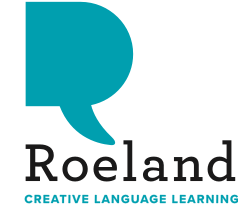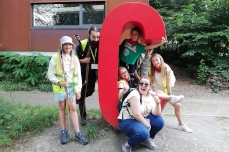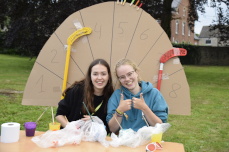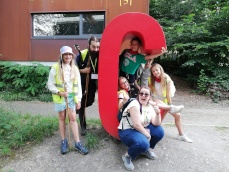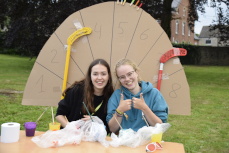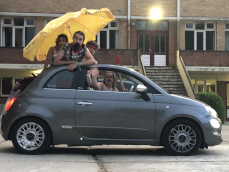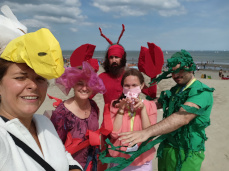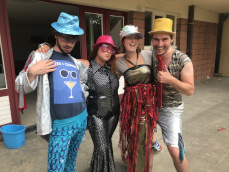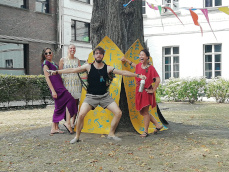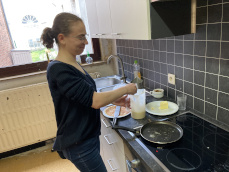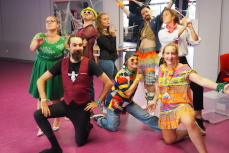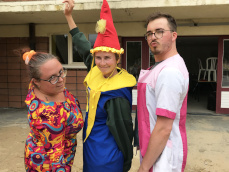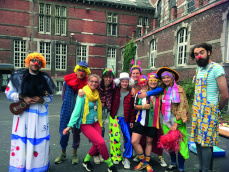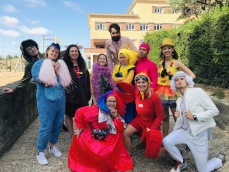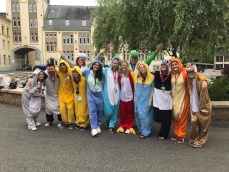Learning a new language is no mean feat for anyone, but for people diagnosed with autism it is not seldom an even more challenging task. Kobe Vanroy taught our volunteers at Roeland how to coach these children and youngsters even better at our language camps.
At a workshop during our kick-off meeting in February, our volunteers were presented with an exercise consisting of ten tasks, in order to experience how autistic people might perceive the world. Kobe, from ‘Sterkmakers in autisme’, provided tips on how to communicate better with autistic children and adolescents.
What is, in your opinion, the connection between autism and the acquisition of a new language?
Kobe: “It is not true that autistic children have a harder time learning a foreign language, although that is often thought. It is our communication style that often poses a problem because it can be ambiguous, in every language. We are used to implying, instead of expressing, what we want. We speak frequently in a polite form. For instance, we say: ‘Can you give me a hand?’ while we actually mean ‘Help me now.’ Phrasing it like that can create confusion for people on the spectrum. So, on top of dealing with vocabulary, grammatical challenges and spelling rules they have to decode the actual message. That is why they encounter difficulties when acquiring a foreign language.”
“It is also difficult for people on the spectrum to see the advantage of learning something now, without a clear view on the beneficial effects in the future. A student from a school in Antwerp will question the added value of learning French, even if the teacher explains why it will be advantageous, for instance when visiting the Ardennes or when applying for a new job. That target is too vague for autistic people. They experience the ‘here’ and ‘now’, and generally lack the imagination to think long term.”
Note from Roeland: At Roeland camp, we link language learning to concrete short-term goals as much as possible. For example, during the language workshop in the morning, participants learn how to order something from the shop, and in the afternoon they actually go to the shop with their activity leader to try out what they have learnt.
Can you share some tips for volunteers to interact with people on the spectrum?
“Be clear. Explicate your message. Do not say ‘we’ll eat later on’ but say ‘we will eat at 12’.”
“Supervisors also can provide too much information. That is something we do not recommend. Keep your message short, simple and to the point. Do not elaborate, for example: ‘We will play a game at 10, on the field next to the canteen, with two teams consisting of 11 players and the intention is to score as much goals as you can, and I’ll be the referee…’. That is too much information for people on the spectrum to digest, and it will be difficult for them to extract the core message.”
“My advice? Just answer the 4 W-questions: ‘who’, ‘what’, ‘where’, and ‘when’. And if deemed necessary, also respond to ‘how’ and ‘why’. These answers are essential to clarify what is going to happen. Added to a distributable week program these answers provide a useful tool for the participants.”
In order for them to see how people with autism experience the world, you asked our volunteers to complete ten tasks. Can you elaborate on such an assignment?
” For example, I asked the volunteers to find out what a certain sign means in a specified country by asking me questions. But these questions had to be truly clear and to the point. I responded very literally to their questions in a way they did not expect. It made them insecure; it created chaos, and it even caused a fair amount of frustration. The volunteers responded to that feeling by telling me that I did not do what they asked me to. After a while, they noticed that I did exactly what they asked me to do while ignoring their implicit demands.”
How did the volunteers react after the workshop?
” The volunteers were very enthusiastic about it. By experiencing firsthand the unpredictability of verbal interaction, they understood the necessity of concise communication. And why it is necessary to explicate your message. Now the volunteers fully understand why children and youngsters do not understand what they want from them right away, and to what demanding situations foggy communication might lead. They experienced overstimulation, and they learned to what unexpected situations can lead and how to deploy useful tools in chaotic situations. It was remarkable to see the eagerness of the volunteers to learn, how they managed the experiments and implemented the tips to deal with tricky situations.”
” Also, the volunteers learned to keep a positive viewpoint on the situation, at all times. Autism is still being perceived as a problem. Children on the spectrum are being viewed as ‘difficult’, with little to no interaction, lacking imagination… But they display their own talents and strong points, just like the rest of us.”
About ‘Sterkmakers in autisme’.
The organisation ‘Sterkmakers in autisme’ wants to inform a larger audience about autism: “We want to support everyone who strives toward more inclusion for people on the spectrum. And we mean everyone: people with autism, their parents and family, professionals, policy makers, politicians and everyone who wants their businesses, organizations and associations to be more open to autistic people.”
Website: www.autisme.be
